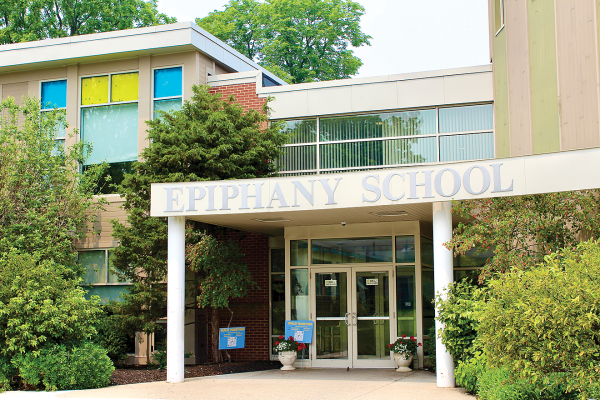June 22, 2023

Before you even make it past the Epiphany School’s main lobby, which is covered in artwork and student-of-the-month photos, the kids welcome you with excited handshakes and kind eyes. Forced to grow up far too soon, their introductions and speech are far beyond their years.
The Epiphany School, located off Centre Street and next to Shawmut MBTA Station, is an independent, tuition-free school that has nurtured and educated hundreds of low-income children over the past quarter century. What began in 1998 as a 40-student middle school now enrolls some 150 students in grades 5 through 8 while also offering an early learning center and a graduate support program. There are also about 3,000 students in various “Epiphany-inspired” schools around the world.
Rev. John H. Finley IV attended the Harvard Divinity School but left to start the Epiphany School. After departing from Cambridge, he moved to Dorchester and lived for a time at Saint Peter’s Convent on Meeting House Hill. Later in his career, the Berkeley Divinity School at Yale awarded him an honorary degree.
When starting Epiphany, Finley looked at the operation of the Jesuit-run Nativity Preparatory School in Jamaica Plain and saw that they selected motivated middle-school boys with engaged parents in low-income circumstances. He wanted to help families from a different setting.
“My kids are students because they are homeless, they have been abused, neglected, and they’re testing about three years behind grade level when they come in fourth grade. But they make about two years of academic improvement every year and graduate above grade level,” he said.
Finley said he and Epiphany staff support students and their families by offering nontraditional school days. The education is free, and school hours are extended in the morning and afternoon to accommodate working caregivers.
“One of our goals is that we want to see every family move out of poverty while the kids are at school,” Finley said. “So, the long day helps with that. Some parents can work and then they have more flexibility in their work time and so forth.”
While schooling doesn’t begin until fifth grade, Epiphany’s early learning center assists mothers-to-be as early as the end of their first trimester. That program helps parents create stable lives and ensures that children will be prepared for kindergarten, supporters say.
The goal is not to “infantilize” the families, Finley said, but rather to help them get through difficult times and set them up for a better future. Even when the families graduate beyond the early learning center and middle school, the graduate support team helps from afar.
“We stay with all of our kids for the rest of their lives,” said Finley. “So that means finding them in high school and college, making sure they have summer jobs, and helping them with employment in their twenties and thirties.
“We survey every kid every year to see how they’re doing and find out what’s going on with them. And we have a center now with multiple staff people. We run a gymnasium with high-speed internet, laundry, shower, and so forth. So, a lot of our graduates come back to school every day.”
Epiphany’s student body is diverse, composed of 68 percent Black, African American, and Caribbean Islanders, 21 percent Latino or Hispanic, and 2 percent white.

Co-founder and head of the school, Rev. John H. Finley IV poses with Principal Michelle (Gomez) Sanchez in front of the Epiphany School entrance
Finley credits his student’s success to the teachers and staff at the school. Michelle Sanchez, a Rhode Island native who attended Boston College, joined Epiphany at its beginning in 1998 as a science and math teacher. She did not have much experience teaching but believes she was hired because she could identify with the students.
As a low-income Black woman, Sanchez found it difficult to fit in at BC. She discovered that education was where she could make the greatest impact on students like herself, telling the Reporter in an interview that “in a world of serving our population of students, it was really important to the founders to have somebody who got it in a way that no one there actually did.”
During her fifth year at the school, Sanchez was promoted to principal, a position she still holds today. She says she is not a rigid leader but rather is open to the ideas of her diverse staff, many of whom are Epiphany graduates.
“It’s this beautiful cycle of they came here, they graduated, they went on to high school, college, and now they’re back and giving back to the next generation of kids. And it’s a beautiful thing I get to experience every day,” Sanchez said.
Another factor that seems to lead to the success and return of Epiphany graduates is the trauma-sensitive approach that staff members take. Both Finley and Sanchez say that participation in individual therapy among students is high. Additionally, each grade has a gender-based therapy group.
Teachers also offer unique classroom setups that create calming environments for students who have endured trauma. Throughout the school, classrooms have an abundance of seating options from desks, to couches and beanbags. Overhead lights are dimmed, and soft lamps are lit. The lighting is paired with aroma therapy and tranquil sounds of mini water fountains and peaceful music.
Diane Patrick, an attorney, a former New York public school teacher, and a former first lady of Massachusetts, serves on the school’s board of trustees. She described the school as one big loving family where arms are wrapped around each other.
“Epiphany is a model of what can be done if you’ve got the right people and the right passions and, actually, the right funding,” Patrick said. “These kids can do what any other children can do if given the opportunities in school to have the same learning, the same helpful environment, the same nutrition, the same counseling, the same access to role models.”



